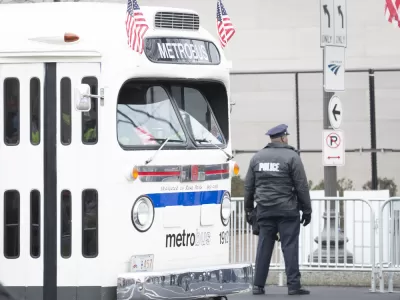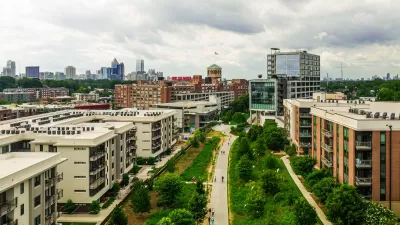Cities have to prioritize displacement as a policy issue if they want to achieve inclusive growth, writes David Whitehead.

As pro-growth and anti-gentrification advocates clash in cities across the U.S., Greater Greater Washington contributor David Whitehead suggests that one way to bridge the divide is by addressing the displacement caused by new development.
"The goals of redeveloping affordable homes, building more homes overall, and maintaining a clear path for original residents to return do not have to be at odds," he writes. If combined with tenant protections and preservation efforts, he argues, growth and redevelopment can be managed in a way that "does not pit the needs of our burgeoning population and the needs of more vulnerable residents against one another."
D.C.'s Comprehensive Plan—not uniquely—doesn't define any policy tools or funding mechanisms aimed at preventing displacement. To fill that gap, Whitehead lays out the principles behind a policy package proposed by the GGW team.
The package suggests new policy tools to preempt a few of the ways that new developments can directly cause displacement. Recommendations include requiring one-to-one replacement of affordable units in new developments, as well as build-first policies, in which existing apartments are not demolished until their replacements are ready. Funding proposals include:
…allowing zoning flexibility to build a taller building, using some of the profit generated from those extra units to subsidize in-house lower-cost units. That might mean expanding voucher programs like DC’s Low Rent Subsidy Program (LRSP), to help meet the gap between what families can afford and what it costs to build a low-cost home.
For more perspectives and debate on these ideas, look no further than the comments.
FULL STORY: DC’s Comprehensive Plan needs to treat displacement as a serious problem

Planetizen Federal Action Tracker
A weekly monitor of how Trump’s orders and actions are impacting planners and planning in America.

San Francisco's School District Spent $105M To Build Affordable Housing for Teachers — And That's Just the Beginning
SFUSD joins a growing list of school districts using their land holdings to address housing affordability challenges faced by their own employees.

The Tiny, Adorable $7,000 Car Turning Japan Onto EVs
The single seat Mibot charges from a regular plug as quickly as an iPad, and is about half the price of an average EV.

With Protected Lanes, 460% More People Commute by Bike
For those needing more ammo, more data proving what we already knew is here.

In More Metros Than You’d Think, Suburbs are Now More Expensive Than the City
If you're moving to the burbs to save on square footage, data shows you should think again.

The States Losing Rural Delivery Rooms at an Alarming Pace
In some states, as few as 9% of rural hospitals still deliver babies. As a result, rising pre-term births, no adequate pre-term care and "harrowing" close calls are a growing reality.
Urban Design for Planners 1: Software Tools
This six-course series explores essential urban design concepts using open source software and equips planners with the tools they need to participate fully in the urban design process.
Planning for Universal Design
Learn the tools for implementing Universal Design in planning regulations.
Smith Gee Studio
City of Charlotte
City of Camden Redevelopment Agency
City of Astoria
Transportation Research & Education Center (TREC) at Portland State University
US High Speed Rail Association
City of Camden Redevelopment Agency
Municipality of Princeton (NJ)





























